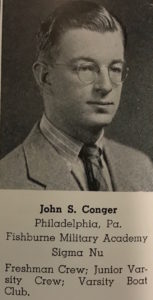The original story came to me from the sons of Penn rower John Conger. They emailed me last year to tell me how their Dad, throughout his life, lamented missing the Olympics because he got the mumps. I had actually trekked to the Penn archives to check out the story. What I found in the 1936 yearbook (published before the Olympic trials) was that John Conger that spring had indeed rowed stroke in the eight for Penn. So I assumed Dick and Nick Congers’ story was correct. After all, you might think that the sons of a champion rower would have the facts straight on their dad’s story. But more has come to light:

As part of a recent move, Dick Conger discovered a 63-page memoir that his late father had written in the 1950s or ‘60s, which the boys had never read. Yes, their dad got sick – but it was strep throat, not the mumps. And while he told his sons over the years about missing the Olympic trials in the Penn Eight, the 1936 disappointment that he wrote about was in a four-oared boat with coxswain.
It’s entirely possible that Conger was slated to race in two different boats. After all, Penn’s Joe Burk competed in both the single and the eight in the 1936 Olympic trials. (My book has an entire chapter on Burk, who failed to make it to the ’36 Olympics but went on to become the greatest rower of the late 1930s). But nailing down the races Conger has been training for may well be impossible.
Such is the fog of history.

Dan Barrow (left) wins bronze at “Hitler Olympics”
Here’s an excerpt from John Conger’s handwritten story, found by his sons:
“In 1936, I rowed out of the Bachelors Barge Club and tried out for the German Olympics in a 4-oar shell with coxswain…We were all in good condition and two of the crew had competed in the 1932 Olympics. We selected ourselves to compete, since the club coach had already picked four men to represent the club in that event, importing two men from other clubs along Boathouse Row – which had made us a bit mad. The other boat was pretty good and the men had good records and they were big.”
When the coach tested his hand-picked crew in a one-mile race against Conger’s, “We beat them by three boat lengths and our rowing time was very fast. They said it was a freak run and we couldn’t do it again. We raced them again the next day and they never had a chance. We beat them better than three boat lengths. It was a matter of coordination. The big men didn’t row well together and when they got tired their rhythm fell apart. Our boat was well matched and our timing was perfect. In due course we went to the several trials in Philadelphia and at Princeton to select the crews to go to Germany and represent the U.S. No boat came close to us.
“The final weekend we had to row three times in two days. We beat all other boats by more than a boat length, which is a strong win as the boats are quite long.

“The next day I woke up with a very sore throat. The doctor said it was strep infection which was serious because in those days we had no antibiotics. I was put in the hospital and my boat was disqualified, for no substitutions were allowed. A Penn Athletic club crew who was second in the trials went to Germany in our place and lost by only six feet.
“Clearly if we had gone over we would have won and been World Champions in our class. It was a great disappointment to all.”
One thing that the Conger boys surely got right, though, was this:
Their father’s lifelong disappointment in missing a chance at Olympic Gold.

Conger’s 1935 Schuylkill Navy Regatta medal proved his rowing prowess.